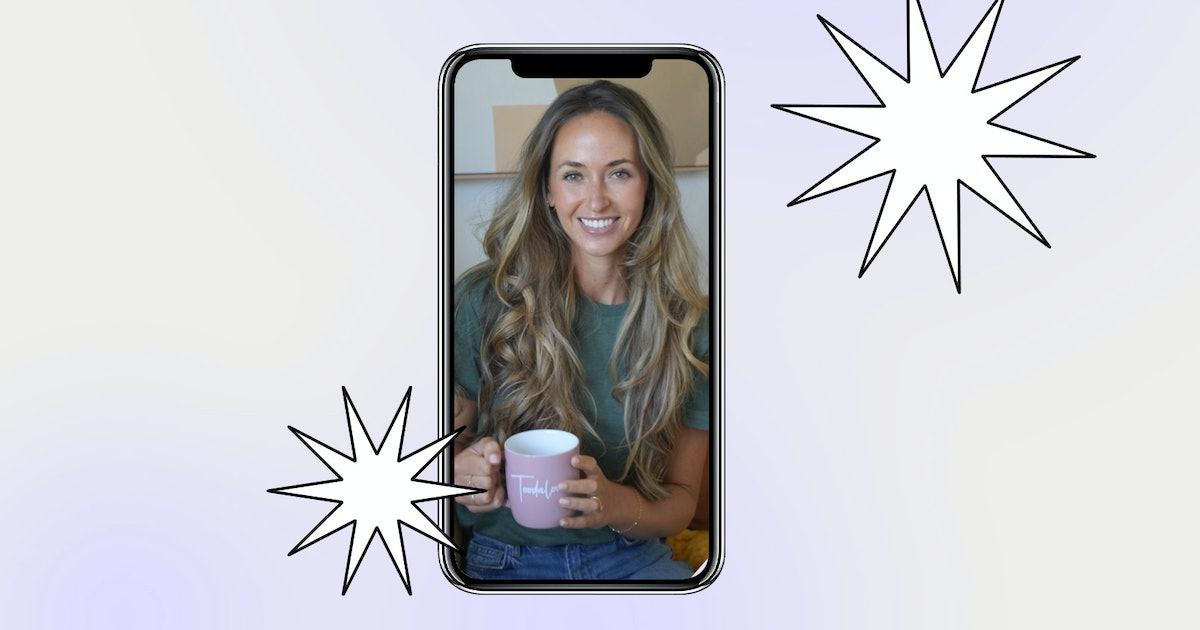[ad_1]
When TikTok creator Laura Whaley — aka @loewhaley, a 29-year-previous who is effective in digital media — was stuck at home in British Columbia, Canada, throughout the starting of the pandemic, she was in a function conference that felt like it was going on for good. Then, a co-worker of hers committed the final Zoom fake pas: asking concerns just as the conference was wrapping up.
As a consequence, she manufactured a amusing TikTok skit about it, portraying diverse reactions to the phone dragging on. She didn’t expect her online video to go viral, but when it did (it has far more than 1.4 million views), she started making extra videos about the office.
Whaley, who now has 3.7 million followers, has turn into a go-to useful resource for her audience when they are battling. In her collection “How Do You Professionally Say…?” she gives suggestions about indicating something correctly to a co-employee or manager, like how to inform another person that you can not just take on their duties. “I draw some inspiration from my time in my qualified everyday living, and I’ve found very a number of different experiences and instances and distinctive management variations inside my personal vocation,” she tells Elite Day-to-day. But she emphasizes that her followers — who selection from Gen Z to Gen X — should really cope with challenges in their very own way.
Below, Whaley shares her expertise heading viral, place of work “red flags” when it will come to boundaries, and strategies for currently being a specialist variation of on your own.
Elite Daily: When you posted your 1st few movies on TikTok, what was the intention behind them? Were being you seeking to gain a next?
Laura Whaley: I experienced like no followers on TikTok, and I considered, “No one’s ever likely to see these,” and then they just began to pop off and go viral. And that is when I was like, “Oh, wait around, maintain up, this could really be a detail.” So, there was no intention at the rear of it.
Men and women moving into the workforce now are questioning why matters are performed a specified way, pushing back again a small bit additional, and keeping firms extra accountable.
ED: How did you sense when persons commented that your video clips strongly resonated with them?
LW: I discovered a whole lot of persons have been coming to my web site and commenting issues like “I considered I was on your own in this” or “I believed I was the only one likely through this.” And I observed this group commencing to variety at a time when a good deal of persons necessary group. That was when I begun to put intention at the rear of the design and style of articles and what individuals had been resonating with.
ED: What are the kinds of films that resonate most with your viewers?
LW: Something about boundary-environment. Historically, we have not seen a ton of boundaries currently being set in the workplace, and so looking at a skit where by it is far more of a sassy reaction, if you will, about boundary-setting is good. It is a minor healing if you have at any time been by one thing like that. It is entertaining, but it also calls out different boundaries that can be set in the workplace. It’s this moment of using again the electric power as an staff and not accepting a thing just for the reason that your manager or organization suggests this is how you do it.
ED: Are there variances in function-life harmony and boundary-placing amongst unique generations?
LW: I imagine it is far more dangerous than valuable to segregate by demographic. Extra a short while ago, in just functioning culture, I’m observing far more boundaries established, regardless of whether they’re established by Gen Z, just moving into the workforce, or becoming set by anyone who’s been in the workforce for 30 years. It is far more of a timeline change than actually this era compared to that era.
ED: Do you feel Gen Z is bringing that new trend of boundary-environment into perform, although? Even if it is not a generational thing, but just a little something new that is related with Gen Z?
LW: Folks coming into the workforce now, I consider, have a better knowing of boundaries. Historically, it is sort of just been like “Well, whichever my employer supervisor needs to meet, that’s what I do.” And now men and women are questioning that and inquiring “Well, why would I have to do the job 60 hrs a 7 days when I’m hired for 40?”
Folks coming into the workforce now are questioning why points are performed a certain way, pushing back a tiny bit far more, and keeping companies a lot more accountable, which I really like.
ED: What do you think are some normal office “red flags” when it will come to boundaries? Anything at all you hear from your audience on this or see on TikTok a good deal?
LW: Everyone’s boundaries look pretty different. So what may be a pink flag for me may possibly not be a pink flag for you within the office.
Some broad bucket types would be the anticipations of doing the job evenings and weekends, higher turnover, and any micromanaging tendencies are a large red flag mainly because that kind of kills my efficiency.
You have to be mindful of trip insurance policies since I have observed a large amount of shifting organizations go into this unrestricted [paid time off], which, in principle, sounds good, but it’s so dependent on your administration and your team and the framework. I really don’t like something which is applied that is quite reliant on supervisors and other potential customers and it’s not constant throughout the board.
You can be helpful with your co-personnel, but I do not automatically propose creating it the house in which you consider to make good friends.
ED: What are your feelings on earning healthier friendships at function?
LW: Friendships at operate are a tough territory. You can be welcoming with your co-workers, but I really don’t essentially advocate making it the space in which you consider to make friends. I would remove that target from a workspace.
You can be actually helpful with co-employees — you could develop fantastic doing the job interactions and a ton of moments you conclude up obtaining for a longer period-term relationships with co-personnel and friendships that follow you outside of the workplace — but you have to be cautious. At the stop of the day, it is a specialist operating setting, and when the traces get blurred between private and skilled, it can get challenging, primarily if everyone’s anticipations aren’t aligned.
ED: What if another person is expected to go to social gatherings, like cocktail hrs, for get the job done? How ought to they technique those circumstances?
LW: It’s all networking in your firm, and you have to glimpse at your expert occupation plans. If significant progress within your job is a massive precedence, expand your network because your network will get you more in your vocation. But if networking isn’t really vital with this group of people today, I believe that there is a respectful way to decline.
You pointed out cocktail socials — I consider to stay away from just about anything in which alcoholic beverages is the focal position when it comes to do the job.
ED: Do you think it is much better to preserve social media profiles non-public and not good friend co-staff when you’re new to a organization or the workforce in common?
LW: I don’t think that there is a blanket solution for that. It’s much more unique and figuring out what you’re comfy with, how a lot you want your co-personnel to know about your own everyday living, and then making that decision on your own. It’s never ever definitely anything that is bothered me simply because I demonstrate up at get the job done extremely likewise to how I am in my individual everyday living. Make absolutely sure you’re comfy with everybody from your everyday living seeing your profile simply because, in my experience, folks will eventually see it.
The argument that you have to hustle and grind for 50 a long time and then retire is what a great deal of people are just not subscribing to anymore.
ED: How did you determine out these predicaments that you communicate about on your TikTok?
LW: I keep in mind when I was getting into the workforce, I was like, “Well, convey to me how to do things.” The danger with that is that when you enter the place of work, whoever you’re quickly working all-around is going to define your established of guidelines and boundaries in the workplace, instead of you coming to the desk and becoming like “OK, what do I want in this structure? What do I experience at ease with?” and utilizing your possess set of principles.
Due to the fact then you commence to just undertake what other persons say as truth of the matter. Then years down the road, you search again, and you’re like, “How have I grow to be somebody so distinctive from who I essentially am inside the workplace?” It is because you begun to adopt all of the factors that people today advised you you shouldn’t be or told you you need to do and under no circumstances actually showed up as yourself.
ED: With Gen Z caring considerably less about hustle society and far more about function-lifestyle harmony, what do you feel the future of the place of work seems to be like?
LW: Hustling should be short-phrase to get you to a put exactly where your function existence is a lot more sustainable and well balanced. I consider limited-expression hustle is productive, but the argument that you have to hustle and grind for 50 years and then retire is what a great deal of persons are just not subscribing to any longer simply because it is not sustainable.
As an individual who sales opportunities a crew, I prioritize people I want my crew and I want my staff to be effective professionally and individually. I want a group that normally takes breaks, that has an identification outdoors of the office, due to the fact then when they exhibit up to perform, you get so a great deal improved output. So I feel that we’re going to see a more healthy office very long time period.
This job interview has been edited and condensed for clarity.
[ad_2]
Source website link









